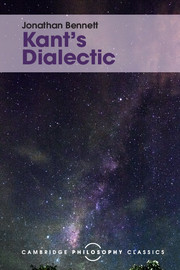Book contents
- Frontmatter
- Contents
- Preface to this edition by Karl Ameriks
- Preface
- System of references
- 1 Introduction
- 2 Concepts and intuitions
- 3 Substances and reality
- 4 The substantiality of the soul
- 5 The simplicity of the soul
- 6 The identity of the soul
- 7 Infinity
- 8 Limits
- 9 Divisibility
- 10 Freedom
- 11 God
- 12 Reason
- Index
Preface
Published online by Cambridge University Press: 05 July 2016
- Frontmatter
- Contents
- Preface to this edition by Karl Ameriks
- Preface
- System of references
- 1 Introduction
- 2 Concepts and intuitions
- 3 Substances and reality
- 4 The substantiality of the soul
- 5 The simplicity of the soul
- 6 The identity of the soul
- 7 Infinity
- 8 Limits
- 9 Divisibility
- 10 Freedom
- 11 God
- 12 Reason
- Index
Summary
This book is a sequel to my Kant's Analytic, but it does not presuppose knowledge of the earlier work. It is the only English book-length commentary on the Dialectic in Kant's Critique of Pure Reason. It may be suggested that one is one too many – that my book fills a welcome gap in the literature – but I would dispute that. I have found that the Dialectic, together with relevant materials from earlier philosophers, especially Descartes and Leibniz, provides the basis for a satisfactory course of fifty-odd classroom hours for graduate students and able undergraduates. Such a course covers a useful amount of ‘history of philosophy’, guided throughout by an interest in a varied but not too scattered set of philosophical problems. Kant's Dialectic might be a help, but what I am confidently recommending is a different work – Kant's Dialectic.
I continue to be, in the words of an unhappy reviewer of my earlier work, ‘one of those commentators who are more interested in what Kant ought to have thought than in what he actually did think’. Still, I try to describe the Dialectic accurately and in some detail. This part of Kant's work is at once knottier and more interesting than is commonly supposed, but the interest is lost if the knots are left tied, and so my philosophical aims have driven me to endeavours which may count as scholarly.
The Dialectic is full of mistakes and inadequacies, or so I shall contend, and of course this is consistent with its being a valuable contribution to philosophy. Still, there are doubtless fewer mistakes than I allege: my charge-list has gradually shortened as I have gained in understanding of the work, and presumably it could be reduced further. But I have worked for as long as I am prepared to, and I now offer what now seems to me to be true. Anyway, when there is evidence of error the truth is better served by an open accusation than by a respectful averting of one's eyes, even in cases where the charge of error can eventually be refuted.
- Type
- Chapter
- Information
- Kant's Dialectic , pp. xi - xiiPublisher: Cambridge University PressPrint publication year: 2016

